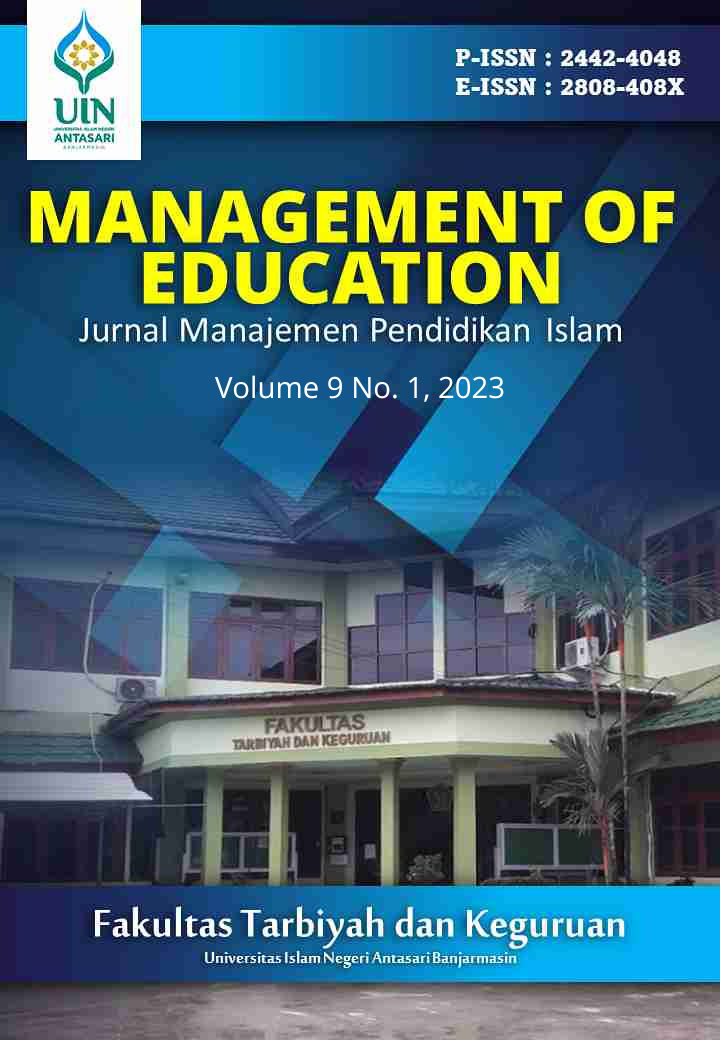PENGARUH MODEL PEMBELAJARAN KOOPERATIF THINK PAIR SHARE TERHADAP HASIL BELAJAR SISWA PADA MATA PELAJARAN IPA DI KELAS VI SD NEGERI 097378 SIBOPO
DOI:
https://doi.org/10.18592/moe.v9i1.8955Keywords:
Learning Model, Think Pair Share, Science Learning OutcomesAbstract
This study aims to determine the effect of science learning outcomes on sixth grade students of SD N 097378 Sibopo with the Think Pair Share (TPS) learning model. This research is an experimental research using one group pretest positives design. The research sample was 22 grade VI students of SD N 097378 Sibopo. The technique of collecting data on student learning outcomes uses test techniques with instruments in the form of multiple choice tests with one correct answer. As a follow-up, the collected data was analyzed using the one sample t-test (t-test) to test the effect of student learning outcomes. ipa class VI at SD N No. 097378 Sibopo with tcount 22.51 > ttable 1.72 and is supported by the difference in the average score obtained by students from the post-test score of 76.36 and the pre-test score of 63.00.References
Abdurrahman. 2012. Penerapan Model Pembelajaran Kooperatif Tipe Think Pair Share (TPS) untuk Meningkatkan Hasil Belajar Peserta Didik pada Pembelajaran IPS di SD Negeri 1 Candasari. Skripsi. Universitas Pendidikan Indonesia.
Afandi, M. Dkk. 2013. Model dan Metode Pembelajaran di Sekolah. Semarang: Sultan Agung Press.
Arikunto, Suharsimi. 2014. Prosedur Penelitian Suatu Pendekatan Praktik. Jakarta: Rineka Cipta.
Awaliah, I. H. 2013. Peningkatan Pembelajaran Materi Bumi pada Siswa Kelas V Sekolah Dasar Negeri Karangjati 01 Kabupaten Tegal melalui Model Think Pair Share. Skripsi Universitas Negeri Semarang: Semarang
Barkah, L. . (2021). Pengaruh Media Flipchart Terhadap Pemahaman Konsep Ipa Kelas Iv Sdn Kalideres 09 Pagi Jakarta Barat. Berajah Journal, 2(1), 195–200. https://doi.org/10.47353/bj.v2i1.76
Djamarah, S. B. 2011. Psikologi Belajar. Jakarta: Rineka Cipta.
Fathurrohman, M. 2015. Model-model Pembelajaran Inovatif. Yogyakarta: ArRuzz Media.
Hamruni. 2012. Strategi Pembelajaran. Insan Madani: Yogyakarta. 220 Hlm.
Hamzah & Mohamad, N. 2012. Belajar Dengan Pendekatan Pemelajaran Aktif Inovatif Lingkugan Kreatif Efektif Menarik. Jakarta: PT. Bumi Aksara.
Huda, Miftahul. 2014. Model-model Pengajaran dan Pembelajaran. Pustaka Pelajar: Yogyakarta. 358 Hlm.
Lisdianto. 2013. Penerapan Model Pembelajaran Kooperatif Think Pair Share untuk meningkatkan Hasil belajar IPA Peserta Didik Kelas IV di SDN Gohong 2 Kabupaten Pulang Pisau Tahun Pelajaran 2012/2013.
Mulghalib. 1. 2017. Pengaruh Model Pembelajaran Kooperatif Tipe Think Pair Share (TPS) Terhadap Hasil Belajar Peserta Didik Pada Mata Pelajaran IPA di Kelas IV Mis. Borong Pa'La'La' Kecamatan Pattallassang Kabupaten Gowa. Universitas Islam Negeri Alauddin.
Poranda, W. O. 2017. Pengaruh Penerapan Model Think Pair Share (TPS) Terhadap Hasil Belajar Siswa Pada Mata Pelajaran IPA Di Kelas V Madrasah Ibtidaiyah Wathoniyah Palembang. (Skripsi). Palembang. UIN Raden Fatah Palembang.
Purwanto 2010. Evaluasi Hasil Belajar. Yogyakarta: Pustaka Pelajar.
Salsabila Fitri Khadar, R. ., Rahmat, D. ., & Saepuloh, L. . (2022). Pengembangan Media Komik Digital Mata Pelajaran IPA Kelas VII di SMP Muhammadiyah Sukabumi. Berajah Journal, 2(3), 410–418. https://doi.org/10.47353/bj.v2i3.113
Downloads
Published
How to Cite
Issue
Section
License
Authors who publish with this journal agree to the following terms:
- Authors retain copyright and grant the journal right of first publication with the work simultaneously licensed under a Creative Commons Attribution 4.0 International that allows others to share the work with an acknowledgement of the work's authorship and initial publication in this journal.
- Authors are able to enter into separate, additional contractual arrangements for the non-exclusive distribution of the journal's published version of the work (e.g., post it to an institutional repository or publish it in a book), with an acknowledgement of its initial publication in this journal.
- Authors are permitted and encouraged to post their work online (e.g., in institutional repositories or on their website) prior to and during the submission process, as it can lead to productive exchanges, as well as earlier and greater citation of published work.









 This work is licensed under a
This work is licensed under a 